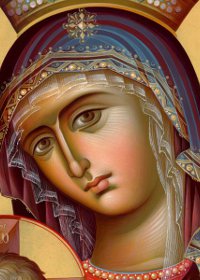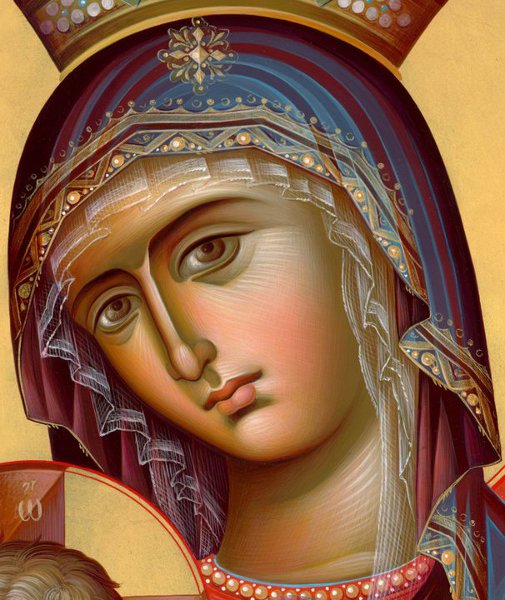During the winter months the sun had already set by the time I reached the Holy Dormition Monastery of the Mother of God. Vespers was most often held in the large catholicon outside the monastery gates. Entering the outer narthex I would light a beeswax candle in front of the festal icon the sisters had laid out on an icon stand. As soon as I opened the large wooden door to the nave I would be greeted by the sound of the nuns melodic chanting and surrounded by the sweet fragrance of burning incense. I would then proceed to the large icon of the Mother of God, depicted with the Lord on her lap. In those sacred, if fleeting, moments a person could feel genuinely connected to the Mother of God. In the dim light of the church, one could even supplicate the Theotokos with tears and be noticed by no one. As far away as she seemed out in the world at times, that much and more close she seemed in the sacred space of her holy monastery.
To stand in the presence of a holy icon is to stand in the presence of the person depicted therein, and so whether we stand before a large icon encased in an elaborately decorated wooden icon stand or before a paper icon taped on the wall of our bedroom, we stand before the holy person whose countenance is painted in line and colour. But in the peaceful, prayerful atmosphere of a holy monastery, we often become more attuned to the spiritual reality surrounding us, and being more attuned to this spiritual reality not only makes our prayer flow more readily but contemplation of holy mysteries comes within our grasp.
It is in moments such as these that I contemplate the person of the Most Holy Theotokos. Thinking on her life and works, her sufferings and sacrifice, I feel as though she offers us the answer to all our problems. The example of her life is the cure to our illness, the source of joy to heal our sorrow. By means of merely two of her countless virtues – obedience and purity – she teaches us everything. In her obedience to God she shows us that perfect freedom and attaining our “full potential” is found in submitting our fallen and corrupted will to the all-good Father, thus molding our will into His will and therefore being able to (eventually) not only “know the good”, but will it and do it.
With her outward and inward purity she points us to the easy path of sanctification. By keeping our souls and bodies pure, by not even accepting corrupted thoughts, we maintain the ability to hear and communicate with God, and thus know how to live in conformity with His will. If we have long ago lost our purity – whether it be mental, spiritual and/or physical purity – we have the opportunity to restore it through confession and repentance. Confession and repentance are our constant means to imitate her virtue and please her Son and our God, as she does best of all.
And so, no matter how ill we are, no matter our upbringing, no matter the genetic weaknesses we have inherited (of body and soul), no matter the state of the world around us, we have the opportunity by God’s grace, through the prayers of the Theotokos, to become healthy, to become holy. We too can, in our own dormition, pass from life to life through a mere “falling asleep”, if only we would imitate her virtue.
As tomorrow is the feast of the Dormition of the Mother of God, I thought I’d share this rough draft of a story I recently wrote for my second book.
- Matushka Constantina
- https://lessonsfromamonastery.wordpress.com


